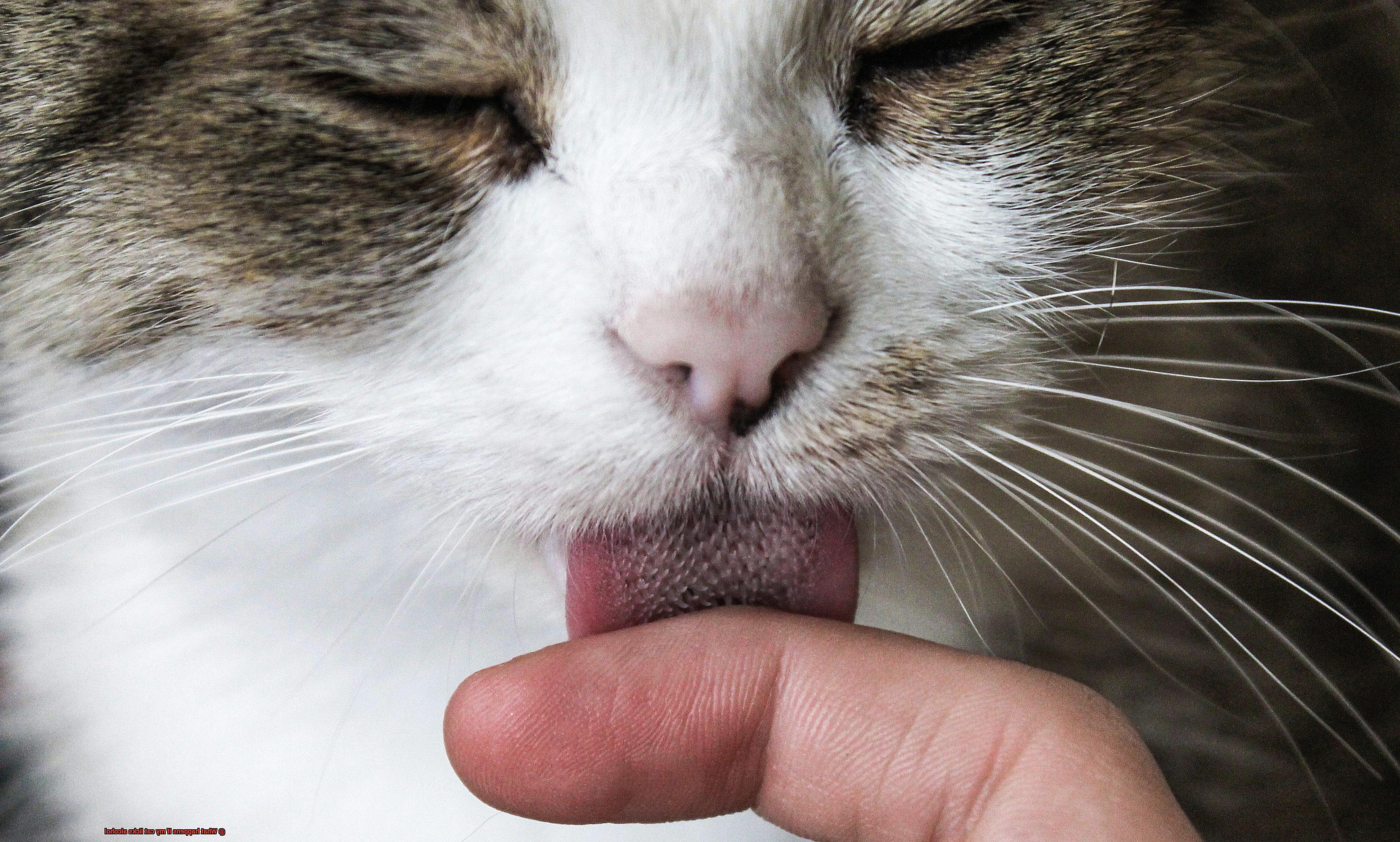Have you ever caught your furry friend sneaking a sip of your alcoholic beverage? While it may seem cute or harmless, ingesting alcohol can have serious consequences for cats. As a pet owner, it’s crucial to understand the dangers of alcohol consumption in animals and how it can impact their health and wellbeing.
Alcohol is toxic to cats, just like it is to humans. However, due to their smaller size and different metabolism, even small amounts of alcohol can wreak havoc on their body. The moment a cat licks alcohol, it quickly enters their bloodstream and can cause an array of symptoms ranging from mild to severe.
Vomiting, diarrhea, difficulty breathing, confusion, lethargy, coma or even death are some common signs of alcohol poisoning in cats. To treat alcohol poisoning in felines typically involves supportive care such as fluids and medication to manage symptoms and prevent complications.
In this article, we’ll delve deeper into what happens if your cat licks alcohol- the potential dangers and warning signs to watch out for- and what steps you should take if you suspect your pet has ingested alcohol. So if you’re a cat lover who wants to keep your feline friend safe from harm’s way- let’s buckle up and dive right in.
Symptoms of Alcohol Poisoning in Cats
One such danger is alcohol, which can cause serious health issues if ingested by cats. Knowing the signs of alcohol poisoning in cats can help you recognize when your pet needs immediate medical attention.
The first symptom of alcohol poisoning in cats is usually vomiting. This occurs because alcohol is toxic to a cat’s digestive system and can irritate the stomach lining. However, this is just the beginning of a range of symptoms that may indicate alcohol poisoning. Other signs to watch out for include difficulty breathing, lethargy, disorientation, loss of coordination, seizures, and even coma.
In some cases, cats may also experience hypothermia or a drop in body temperature. This can be particularly dangerous, as it can worsen other symptoms and cause the cat’s condition to deteriorate rapidly.
It’s worth noting that the severity of these symptoms depends on several factors, including the amount of alcohol ingested and the overall health of the cat. Kittens and smaller cats are more vulnerable to alcohol poisoning than larger cats.
If you suspect your cat has ingested alcohol, it’s essential to seek veterinary care immediately. Your veterinarian will perform a physical examination and may order blood tests to determine the level of toxicity in your cat’s system. Treatment usually involves supportive care, such as intravenous fluids and monitoring of vital signs.
Preventing accidental ingestion of alcohol is crucial in keeping your cat safe. Store all alcohol in a secure location where your cat cannot access it. Clean up any spills or drips immediately, and keep a close eye on your cat during parties or gatherings.
Diagnosis of Alcohol Poisoning in Cats
While you may think alcohol is something your cat would never come into contact with, it’s essential to know that even small amounts can be toxic to them. As such, it’s crucial to understand the diagnosis of alcohol poisoning in cats.
Diagnosing alcohol poisoning in cats can be challenging since symptoms mimic those of other illnesses. However, recognizing the signs quickly is important, as immediate veterinary care can prevent further deterioration. The first step is to provide a thorough history of your cat’s recent activities. Have they accidentally ingested alcohol or come into contact with products containing alcohol? This information can help your vet determine the cause of your cat’s symptoms.
Next, your vet will perform a physical examination to check for signs of alcohol poisoning. These may include difficulty walking or standing, vomiting, diarrhea, shallow breathing, and dehydration. Blood tests may also be necessary to assess liver and kidney function and electrolyte levels.
If your cat is severely ill or showing severe symptoms, they may require hospitalization for supportive care. This can include IV fluids and medications to manage seizures or respiratory distress. In severe cases, your cat may need to be placed on a ventilator to assist with breathing.
It’s important to remember that cats are highly sensitive to alcohol, so it’s crucial to take extra precautions to keep them away from alcoholic beverages and products containing alcohol. If you suspect your cat has ingested alcohol or is showing any signs of alcohol poisoning, seek immediate veterinary care.
Treatment of Alcohol Poisoning in Cats
Well, wonder no more. In this section, we will explore the treatment of alcohol poisoning in cats, and what you can do to help your beloved pet.
First and foremost, it’s important to recognize the symptoms of alcohol poisoning in cats. These may include vomiting, diarrhea, disorientation, lethargy, seizures, and even coma. If you notice any of these symptoms or suspect that your cat has ingested alcohol, seek immediate veterinary care.
At the veterinarian’s office, they will perform a physical exam and run diagnostic tests to determine the severity of the poisoning. The treatment for alcohol poisoning in cats varies depending on the severity of the symptoms. For mild cases, the vet may induce vomiting to remove any remaining alcohol from the stomach. They may also administer activated charcoal to absorb any leftover alcohol.
However, for more severe cases, hospitalization may be necessary. Intravenous fluids can help prevent dehydration and maintain electrolyte balance. The veterinarian may also administer medications to control seizures and other symptoms.
It’s important to note that home remedies such as milk or vegetable oil should not be given to cats with alcohol poisoning. These remedies can worsen the condition by causing aspiration pneumonia or other complications.
Prevention is always better than cure when it comes to alcohol and pets. Keep all alcoholic beverages out of reach of your pets and never give them any alcoholic beverages intentionally. Remember that swift veterinary attention is crucial for a full recovery.
In summary, here are some key takeaways:
- Recognize the symptoms of alcohol poisoning in cats
- Seek immediate veterinary care if you suspect your cat has ingested alcohol
- Treatment depends on the severity of the symptoms
- Mild cases may be treated with vomiting induction or activated charcoal
- Severe cases may require hospitalization for intravenous fluids and medication
- Home remedies such as milk or vegetable oil should not be given to cats with alcohol poisoning
- Prevention is always better than cure
Prevention of Alcohol Poisoning in Cats
Cats are not immune to the effects of alcohol, and even small amounts can cause serious harm. Here are some practical tips to help you prevent alcohol poisoning in cats:
Firstly, store your alcohol out of reach. Curiosity is a cat’s middle name, and they will explore anything within their reach. Keep your alcohol bottles and glasses in a cabinet or on a high shelf where your cat cannot access them. This simple step can prevent unintended exposure.
Secondly, be mindful of spills. Accidents happen, but it’s essential to clean up any spilled alcohol immediately. Cats often lick and clean themselves, and any leftover alcohol can be dangerous.
Thirdly, educate guests about the potential danger to your cat if they bring alcohol into your home. Ask them to keep their drinks away from your furry friend and explain the importance of keeping alcohol out of reach for pets.
Lastly, keep an eye on your cat’s behavior and look out for any symptoms of alcohol poisoning such as vomiting, disorientation, and difficulty breathing. If you suspect that your cat has ingested alcohol, seek immediate veterinary care.
Common Household Items Containing Alcohol That Can Harm Your Cat

You may be surprised to learn that alcohol can be found in many common household items, which can be harmful to cats if ingested. It is essential to know which household products contain alcohol to prevent accidental poisoning.
Antifreeze is one household item that contains alcohol. This liquid is commonly used in car engines to lower the freezing point of the coolant, but it contains ethylene glycol, which can cause kidney damage and even death if ingested by cats. Therefore, it is crucial to keep antifreeze away from cats and clean up any spills immediately.
Hand sanitizer is another household item that contains high levels of alcohol. With alcohol content ranging from 60-70%, hand sanitizers can be toxic to cats if ingested. To prevent any mishap, make sure you let the sanitizer dry completely before handling your cat and store it in a safe place out of reach.
Mouthwash and other oral hygiene products also contain alcohol, even a small amount of which can have a severe impact on your cat’s health if ingested. Keep these products out of reach of your feline friend to avoid any accidental poisoning.
Cleaning products such as disinfectants and surface sprays are also common household items that contain alcohol. Ingesting these products can cause skin irritation, vomiting, and even respiratory problems in cats. Always read product labels carefully before using them and avoid using them around your cat or store them in a place inaccessible to your cat.
What to Do if You Suspect Your Cat Has Ingested Alcohol
Alcohol can be extremely harmful to cats, and it is crucial to act quickly if you suspect that they have consumed any.
Here are some steps you can take in case of alcohol ingestion:
- Determine the amount of alcohol ingested: If you know the amount of alcohol your cat has consumed, it can be helpful for the vet to determine the best course of action. However, if you are unsure, do not waste any time and seek veterinary assistance immediately.
- Contact your veterinarian: Call your vet as soon as possible and describe your cat’s symptoms. They will be able to provide you with specific instructions depending on the severity of your cat’s condition.
- Keep your cat calm: While waiting for veterinary assistance, keep your cat in a quiet and comfortable environment. Ensure that they are warm and calm and remove anything nearby that could cause further harm or distress.
- Avoid giving food or water: It is critical not to give your cat any food or water until advised by a veterinarian. Ingesting any food or drink could worsen their symptoms or interfere with any treatment they may require.
- Prevention is key: To prevent alcohol ingestion in the future, keep all alcoholic beverages and products out of reach of your cat. This includes beer, liquor, wine, as well as foods that may contain alcohol such as fruitcake or rum cake.
How to Keep Your Cat Safe from Accidental Ingestion of Alcohol
As a responsible pet owner, it’s important to take all necessary precautions to ensure the safety of your cat. One of the key measures to take is to prevent accidental ingestion of alcohol. Here are some tips on how to keep your cat safe from alcohol:
- Secure Storage: The first step is to store all alcoholic beverages in a safe place that is out of reach of your cat. This could mean storing them in a cabinet or on a high shelf. It’s important to make sure that the storage location is secure and inaccessible to your curious feline friend.
- Immediate Clean-Up: Accidental spills or drips of alcohol should be cleaned up immediately. Cats are inquisitive creatures and may try to lick up any spilled liquid, even if it’s toxic. Use a pet-safe cleaner when cleaning up any spills.
- Supervision During Gatherings: If you’re hosting a party or having guests over, make sure they are aware of the dangers of giving alcohol to pets. Keep an eye on your cat’s whereabouts at all times and consider keeping them in a separate room during gatherings.
- Use Lids or Covers for Drinks: If you plan on consuming alcohol around your cat, use a lid or cover for your drink to prevent any accidental spills that your cat may try to lick up. This can be especially useful if you have a curious and adventurous cat who likes to explore their surroundings.
- Know the Signs of Alcohol Ingestion: Even small amounts of alcohol can be toxic to cats, so it’s important to know the signs of ingestion. Symptoms can include vomiting, diarrhea, difficulty breathing, tremors, and even coma or death in severe cases. If you suspect that your cat has ingested alcohol, seek veterinary attention immediately.
Common Myths About Cats and Alcohol
Many people believe that cats can handle alcohol better than humans and that it can even calm down a stressed-out feline. However, these misconceptions could prove fatal for your furry friend.
Myth #1: Cats can handle alcohol better than humans.
This myth is entirely false. While certain substances may have a higher tolerance in cats than humans, alcohol is not one of them. In fact, cats have smaller livers, making them less efficient at breaking down toxins in their bodies. Even small amounts of alcohol can cause harm to your cat, so it’s vital to keep all alcoholic beverages out of reach.
Myth #2: Alcohol can help calm a stressed-out cat.
While it may be true that alcohol has a calming effect on humans, the same cannot be said for cats. Alcohol is a depressant that affects the central nervous system, leading to disorientation, confusion, and seizures in felines. Giving your cat alcohol to calm them down is not only ineffective but also dangerous.
Myth #3: Alcohol is not toxic to cats unless consumed in large quantities.
This myth is perhaps the most dangerous of them all. Ethanol, the type of alcohol found in alcoholic beverages, can cause liver damage, brain damage, and even death in cats. Even small amounts of alcohol can be toxic to cats, making it crucial to keep all alcoholic beverages out of their reach.
To ensure your cat’s health and safety, there are several precautions you can take. These include storing drinks securely, cleaning up spills immediately, supervising your cat during gatherings, using lids or covers for drinks, and knowing the signs of alcohol ingestion to seek veterinary attention promptly.
gQP4GKREuhw” >
Conclusion
In summary, it’s crucial to be aware of the dangers of alcohol consumption for cats and how it can affect their health. Just like humans, alcohol is toxic to felines, and even small amounts can have severe consequences due to their smaller size and metabolism. Once a cat licks alcohol, it quickly enters their bloodstream and can cause a range of symptoms from mild to life-threatening.
Symptoms of alcohol poisoning in cats include vomiting, diarrhea, difficulty breathing, confusion, lethargy, coma or even death. Treatment typically involves supportive care such as fluids and medication to manage symptoms and prevent complications.
To keep your cat safe from accidental ingestion of alcohol, make sure all alcoholic beverages are stored securely out of reach. Clean up any spills or drips immediately and supervise your feline friend during parties or gatherings. Using lids or covers for drinks around pets is also a good idea.
It’s important to recognize the signs of alcohol poisoning in cats and seek immediate veterinary care if you suspect your pet has ingested alcohol. Treatment depends on the severity of the symptoms; mild cases may be treated with vomiting induction or activated charcoal while severe cases may require hospitalization for intravenous fluids and medication.
Remember that prevention is always better than cure when it comes to keeping your beloved pet safe from harm’s way.


